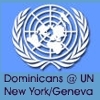

| BRIEFING - April 6 , 2011 | To learn more about the Millenium Development Goals, click on the graphic Past Briefings: March 23, 2011 March 9, 2011 February 9, 2011 January 26, 2011 January 12, 2011 December 29, 2010 December 15, 2010 December 1, 2010 |
|
Consultation on The Human Right to Peace NGO organizations who have either supported or wish to support The Santiago Declaration on the Human Right to Peace (December 2010), were invited to a consultation meeting in New York on March 22 to receive up-to-date information on the advancement of the declaration and to provide feedback on it. The meeting was timed to coincide with a similar meeting held in Geneva. The Santiago Declaration has been 10 years in the making, primarily spearheaded by the Spanish Society for International Human Rights Law (SSHIRL). Professor Carlos Villan Duran, president of SSIHRL, provided an insight into the necessity for this instrument. He noted the following:
Duran further elaborated on what he called “three aspects of good news regarding peace” and efforts to ensure that a Universal Declaration of the Human Right to Peace is achieved.
Duran commented that the Santiago Declaration is seen as complementing the Universal Declaration on Human Rights by adding something very specific concerning the right to peace. Given that the UDHR was written in 1945 by the victors of WWII, and 66 years have elapsed, we need to re-read the UDHR with a new vision of peace. Cora Weiss, president of the Hague Appeal for Peace, a key NGO supporter of the human right to peace and the Santiago Declaration, noted that the “revolutionary atmosphere taking place at this time particularly in the Middle East” demonstrates that civil society globally wants to live in peace and will act to free itself from violence, particularly where it is perpetrated by the regimes of despotic dictators. Civil society must continue, or in some countries begin, to “make our own peace and hope that governments will catch on” and implement peace. Action is important and is contagious! Weiss believes that the Santiago Declaration provides a “more holistic and far-reaching definition of peace” than any other document produced internationally, and that it is a declaration “for the survival of humanity.” Jacqui Ryan, OP (New Zealand)
|
Dominican Leadership Conference
Building relationships and collaborating in the mission of preaching the Gospel
29000 West Eleven Mile Road
Farmington Hills MI 48336
248-536-3234 Contact: Executive Director
